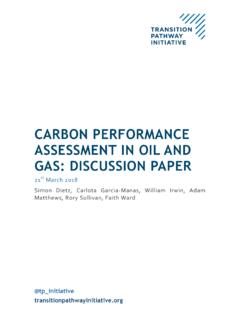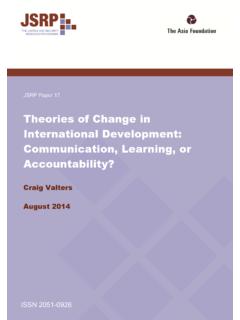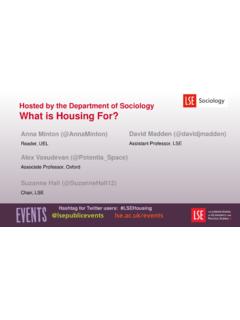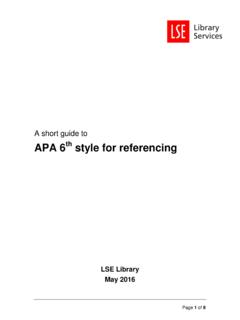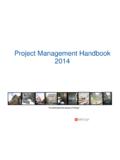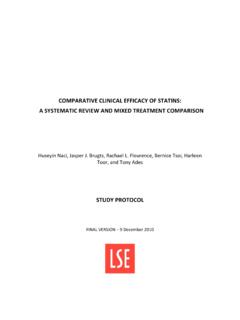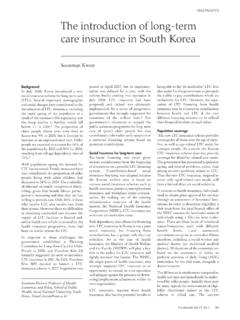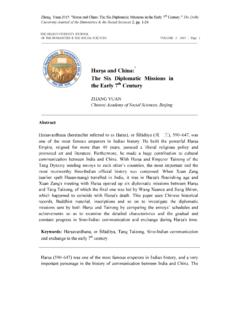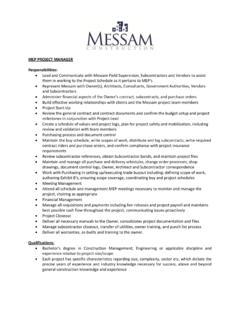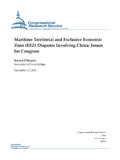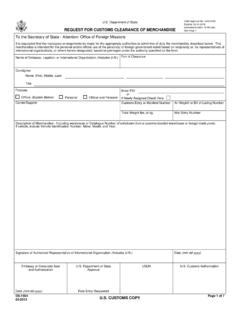Transcription of Futures for diplomacy - LSE Home
1 Futures for diplomacyIntegrative diplomacy in the 21st CenturyBrian HockingJan MelissenShaun RiordanPaul SharpReport1 NoOctober 2012 / Report No1 October 2012 / Report No1 Futures FOR DIPLOMACYI ntegrative diplomacy in the 21st CenturyA report prepared byBrian HockingJan MelissenShaun RiordanPaul SharpOctober 2012 Netherlands Institute of International Relations Clingendael October 2012 / Report No1 October 2012 / Report No1 ContentsPreface ..5 The Authors ..7 Executive : Puzzles for Contexts and Locations for Rules and Communication Patterns ..374 Actors and Roles.
2 55 Futures for diplomacy : Key Sources and 2012 / Report No11 October 2012 / Report No1 PrefaceThe Clingendael Institute was commissioned by the Ministry of Foreign Affairs of Finland to write this report. It discusses the changing environment of diplomacy in terms of four key dimensions of what is termed integrative diplomacy : contexts and locations, rules and norms, communication patterns and actors and roles. It explores the consequences of this changing diplomatic environment for the processes and structures of diplomacy , particularly ministries of foreign affairs. The report is one output from a larger and developing international project on Futures for diplomacy .
3 2 October 2012 / Report No13 October 2012 / Report No1 The AuthorsBrian Hocking is Emeritus Professor of International Relations at Loughborough University. He is also a Senior Visiting Fellow at the Netherlands Institute of International Relations Clingendael and Visiting Professor at the College of Europe, Bruges. He is associate editor of The Hague Journal of Melissen is Director of Research at the Netherlands Institute of International Relations Clingendael . He is also Professor of diplomacy at Antwerp University (Belgium) and teaching at Leiden University. He is founding Co-Editor of The Hague Journal of diplomacy (HJD) and series editor of the Diplomatic Studies series with Martinus Nijhoff.
4 Jan Melissen recently co-edited Public diplomacy and Soft Power in East Asia (2011), Consular Affairs and diplomacy (2011) and Economic diplomacy (2011).Shaun Riordan is a Senior Visiting Fellow at the Netherlands Institute of International Relations Clingendael . A former British diplomat, he is also Head of Economics and Theory of Knowledge at International College Spain and an independent geopolitical Sharp Professor of Political Science at the University of Minnesota Duluth, and Senior Visiting Fellow at the Netherlands Institute of International Relations Clingendael . He is author of Diplomatic Theory of International Relations (Cambridge University Press), co-editor of American diplomacy (Brill) and The Hague Journal of diplomacy , and co-series editor for Palgrave s Studies in diplomacy and International Relations.
5 4 October 2012 / Report No15 October 2012 / Report No1 Executive Summary The diplomatic environment of the 21st century is marked by change and uncertainty. Particular features include: The expansion in the number and variety of international actors empowered by the ICT and social media. These actors now extend beyond traditional NGOs to more amorphous civil society groups. The development of a new international security agenda focused on the security of the individual within the state and including issues such as climate change or pandemic disease that go well beyond traditional concepts of international security.
6 The resurgence of more traditional geopolitical agendas as states compete for power, resources or territory. The expansion of regulatory diplomatic agendas, enhanced by the global financial crisis and demands for more effective banking regulation. The progressive fragmentation of the rules and norms governing international political and trade relations as more confident emerging states increasingly assert their own values and rules. One consequence will be a continuing weakening of multilateral institutions. Whilst diplomats must now share the stage with a broad range of actors and institutions, despite much conventional wisdom regarding the impact of globalization, states remain important actors in international affairs.
7 Government diplomacy therefore remains a significant factor in protecting national interests, developing global governance and promoting international peace and security. Diplomats will cease to be gatekeepers guarding the borders of the foreign, becoming instead boundary spanners integrating the different landscapes and actors of the diplomatic environment. The Integrative diplomacy framework developed in this report argues the need to integrate change and continuity, different agendas and arenas, different diplomatic processes and structures and machinery of diplomacy . Above all, it stresses the importance of the growth of international policy networks and, consequently, the importance to effective diplomacy of collaboration between professional diplomats and the representatives of a variety of international actors.
8 The breakdown of the distinction between domestic and international affairs means that the national interests of a country now involve the whole of government and, therefore, the importance of coordination between government agencies. Foreign ministries should see themselves as part of this national diplomatic system and consider their changing role in this light. The increasing demands of regulatory diplomatic agendas will imply increasing involvement of financial and other ministries in international policy. 6 October 2012 / Report No1 Foreign Ministries will remain responsible for managing their diplomatic networks.
9 Demands on these networks will increase not reduce. With increasing pressures on expenditure, this will require clear prioritization of interests and innovative organizational solutions. These include: administrative hubs, reducing administrative burdens on smaller embassies. virtual embassies, with officers combining on-line monitoring of countries with periodic visits. swarming, using innovations in human resource management to allow the rapid concentration of necessary resources in emergencies. a diplomatic reserve , allowing the cost effective maintenance of a broad range of international knowledge or skills through networks of reserve diplomats in the academic and private sectors.
10 Integrative diplomacy involves an understanding of changing patterns of diplomatic communication. Foreign ministries must devise effective public diplomacy strategies integrated fully into the policy-making machinery. This requires a sophisticated understanding of stakeholders and audiences. Foreign Ministries must also ensure that other elements of the national diplomatic system understand the centrality of public diplomacy and its medium and long term strategic purposes. The new international security agenda requires new approaches to diplomacy . Its issues are highly interdependent, requiring holistic solutions, international cooperation and, increasingly, collaboration between international civil societies.
